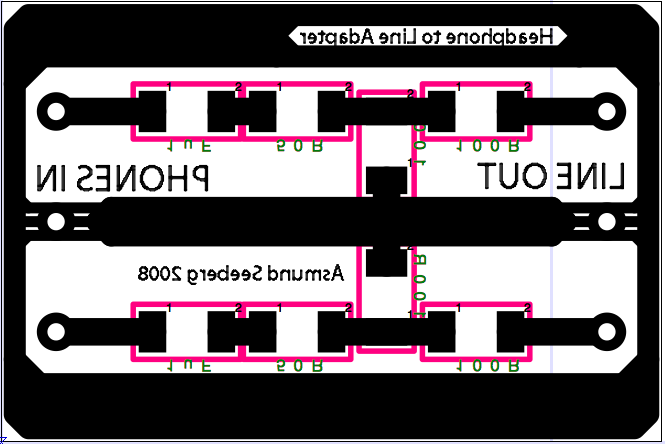Audio attenuator
I have made a simple audio attenuator for decreasing the amplitude of an audio signal. It is supposed to match a headphone output to a line-in input. My question is, if I use a 1uF coupling capacitor as a protection for DC current, will the audio signal be able to pass that capacitor?
Here is the scheme:
Here is the scheme:



Comments
At low frequencies (your bass), the input capacitor can be seen as a frequency dependent resistor, the lower the frequency the higher the resistance. What this means is that your bass signals are all but eliminated leaving the·output sounding tinny, much like old recordings made before·electrical amplification existed. At a certain frequency and above·the capacitor acts like a a short (IOW it's acts like it's not there), the range of frequencies this is true·is called the pass-band of the filter.
I have attached a plot of the response of one channel of your circuit. The line which starts in the lower left hand corner is the magnitude response and the one that starts in the upper left is the phase response. It's the magnitude response we have been talking about. Notice the "knee"? This is the corner·frequency which denotes the border between the pass and stop bands. Increasing the capacitor value shifts the corner frequncy left towards lower frequencies, while decreasing the value shifts the corner frequency to the right. The way the filter is designed right now, frequncies less than 1kHz are attenuated·by varying amounts depending on its frequncy (the closer it·gets to 1kHz, the more of the signal is passed through). Signals beyond 1kHz pass through unencumbered.
One final note, it is difficult to discern the effect of the last 100 Ω resistor without knowing what the load is, if it is a high impedence input,·very little current flows through the resistor and the voltage seen on the line in is the voltage·established by the 50 Ω/100 Ω·voltage divider (for frequencies above 1kHz the output is 2/3 the input). If some current is sourced through the last resistor then the voltage seen by the line in is 200/(3*(Rin+100)) of the input (for frequencies·> 1kHz)·where Rin is the input resistance of the line in.
▔▔▔▔▔▔▔▔▔▔▔▔▔▔▔▔▔▔▔▔▔▔▔▔
Paul Baker
Propeller Applications Engineer
Parallax, Inc.
Post Edited (Paul Baker (Parallax)) : 2/27/2008 10:55:47 PM GMT
▔▔▔▔▔▔▔▔▔▔▔▔▔▔▔▔▔▔▔▔▔▔▔▔
PLEASE CONSIDER the following:
Do you want a quickly operational black box solution or the knowledge included therein?······
The problem I am trying to solve is the following:
I have connected headphones out port of a radio to Line input of an amplifier. The problem is that there is clipping of the sound when I crank up the headphones output volume enough. Making the headphones output volume low and the amplifier high gets noise.
I though the capacitors might protect against excessive DC current, but I see that was a really bad idea.
Thanks for the great answers.
What is really a bad idea is to try an do this without fulling understanding the circuit's design principles. That is how you get clipping rather than faithful replication. Passive component combinations that have capacitors or coils do indeed create filter situations and always some overall element of loss.
It isn't really bad to remove the bass if you want to eliminate overall volume from an audio signal that you to get information from [noparse][[/noparse]speach rather than music] because bass generally uses a lot more power to drive it due to the slowness of the pulse. I suspect the Apple Ipod avoids the bass so that the battery life is longer. Telephone communication eliminates most of the high and the low end from audio to narrow the bandwidth. We still hear speach clearly, but the phone company can put more calls on one wire. But, in many cases the percieved volume is not reduced very much.
Of course, if you want attenuation and audiophile quality, it is a whole different approach. You might even consider Op Amps and feedback circuitry to limit the output to the earphones while faithfully replicating all of the signal's bandwidth.
I'd love to have something like that for my computer audio.
When I am using the computer late at night, I sometimes hit a website that puts out a loud audio message and I have to grab to turn the speaker off. Other websites aren't so loud. What I'd love is to set the audio output limit regardless of the input level. When I'm using earphones, it would protect my ears; when I'm using a speaker, it would not wake up the neighboors.
I suspect some sort of negative feedback loop with a zener diode might do the trick. When the output is below the zener's level, everything goes through. But onces the voltage of the output rises above the zener, negative feedback dampens the audio output.
▔▔▔▔▔▔▔▔▔▔▔▔▔▔▔▔▔▔▔▔▔▔▔▔
PLEASE CONSIDER the following:
Do you want a quickly operational black box solution or the knowledge included therein?······